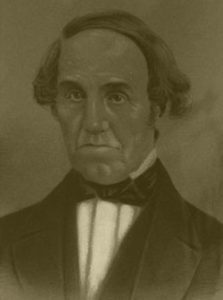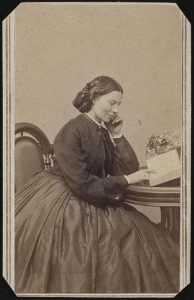Captain Barton: Advising His Daughter To “Serve and Sacrifice”

For Father’s Day
Clara Barton wanted to make a difference. She wanted to go to the battlefield and camps to care for the sick and wounded. For long weeks of 1861, she had been laying her plans, strengthening her political connections, and renewing acquaintances with Massachusetts boys — even some of her former school pupils — now in Union uniform. The preparations neared completion, but Barton worried about the propriety of her next step. How would soldiers treat her? What would they think of her? During a visit to her family home in March 1862, Barton confided her plans and her fears to her father, anxious for advice.
By 1862, Captain Stephen Barton was on his deathbed, but he had spent years inspiring his youngest daughter with family stories of patriotism and soldiering. Born in 1774, he had grown up in the days of the Revolutionary War and had later fought with “Mad” Anthony Wayne in the Indian Wars in the Northwest Territory. Returning to his home state, Stephen Barton took up farming and occasionally took an active role in local civic government. His title “Captain” came from the days when he had been selected to lead and drill the local militia.

Clara Barton, born on Christmas Day 1821, was the youngest of Stephen Barton’s five children and a significant age gap separated her from her older siblings. Scholarly but socially fearful, Clara gravitated to her father’s stories of adventure and courage. Her Captain-Father even allowed her play wargames and mock battles. In later years, she recalled her father saying, “you are more boy than girl” and the farm adventures and military stories shaped her life and her world-changing choices. Clara Barton did not marry, instead pursuing a career as an educator and later an employee at the Patent Office in Washington D.C. From her office in the capital city, she was a first-hand witness to the rising sectional conflict fiercely debated in Congress and among the representative politicians. The Civil War started in reality for Clara Barton when she found some of her former students among the frightened, angry, and hurt volunteer soldiers of the 19th Massachusetts who had been attacked in Baltimore on their way to Washington in April 1861. Observing supply and medical needs over the following weeks and months, Clara wanted to get to the frontlines of a campaign where she might be able to make a difference with food, medical needs, or nursing skills.
Sitting at her father’s bedside, Clara explained her plans and the preparations she had been making. Then, she bluntly asked her father for his opinion. How could she go to a camp or hospital of soldiers and maintain her reputation as a lady?
Enthused about his daughter’s plans, Captain Barton reassured her, saying, “I know soldiers, and they will respect you and your errand.” He explained that in his experience even the toughest soldiers showed respect to a woman with a good and kind reputation. Then, Captain Barton went a step beyond opinion and advice. He ordered his daughter to go and serve. Her duty would be to “seek and comfort the afflicted everywhere.” Further, he explained that as the daughter of a patriot, she had “to serve and sacrifice for my country in its peril and strengthen and comfort the brave men who stood for its defense.”
Captain Barton’s opinions and his charge removed the final barriers of doubt from Clara’s mind. Shortly after that conversation, she wrote to the Massachusetts governor, asking permission and endorsement to go with General Burnside’s army to North Carolina and nurse Massachusetts soldiers who fell ill or wounded. Although the governor welcomed Clara Barton’s correspondence and wanted to assist her, other circumstances prevented her from carrying out that mission, forcing her back to Washington D.C. to create another path to the front lines for relief work.
Shortly after Clara wrote to the governor, her father died on March 21, 1862. Though his youngest daughter still had wait to get to the battlefields, Captain Barton’s words strengthened her resolve. Standing with her family at her father’s funeral, Clara felt alone and devastated, writing to a relative: “The old soldier’s heavy march is ended. For him the last tattoo has sounded, and resting upon the unfailing arms of truth hope and faith he awaits the ‘reveille of the eternal morning.’”
But the “old soldier” had passed a patriotic charge and legacy to his daughter. Already, the letter to governor contained these written words which would shape Clara Barton’s service during the Civil War and beyond: “I ask neither pay or praise, simply a soldier’s fare and the sanction…to go and do with my might, what ever my hands find to do.”
Though it would take more time before the politicians, officers, and doctors would allow and accept Clara Barton to go to the battlefields, she had already received the sanction most desired for her patriotic service: her father’s blessing. With her father’s words guiding her next steps, Clara Barton would go forward to save lives at the frontline field hospitals, find answers for families with missing soldiers, advocate for women’s rights, and eventually help to found the American Red Cross.
Sources:
Stephen B. Oates, A Woman of Valor: Clara Barton and the Civil War (New York: Macmillan, 1994). See pages 40-41 for quotes.
Elizabeth Brown Pryor, Clara Barton: Professional Angel (Philadelphia: University of Pennsylvania Press, 1987).
Thank you very much for this poignant account of the close relationship between Clara Barton and her father and how he strongly influenced her decision to become a nurse.